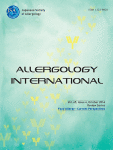
ALLERGOLOGY INTERNATIONAL
Scope & Guideline
Innovating solutions in allergy management.
Introduction
Aims and Scopes
- Allergen Immunotherapy:
The journal consistently explores various aspects of allergen immunotherapy, including its efficacy, mechanisms, and applications in different allergic conditions such as asthma, rhinitis, and food allergies. - Food Allergies and Intolerance:
Research on food allergies, including non-IgE-mediated reactions, is a core focus, with studies investigating the clinical characteristics, epidemiology, and management strategies for conditions like food protein-induced enterocolitis syndrome. - Eosinophilic Disorders:
There is a significant emphasis on eosinophilic disorders, particularly in relation to asthma and chronic rhinosinusitis, examining the roles of eosinophils in inflammation and the efficacy of biologic treatments. - Genetic and Molecular Insights:
The journal features studies that delve into the genetic and molecular underpinnings of allergic diseases, including investigations into specific biomarkers and genetic predispositions that influence disease severity and treatment outcomes. - Clinical Guidelines and Practice:
ALLERGOLOGY INTERNATIONAL publishes articles that contribute to the development of clinical guidelines and best practices in allergology, enhancing the translation of research findings into clinical settings.
Trending and Emerging
- Biologics and Targeted Therapies:
There is a growing focus on biologic treatments for allergic diseases, particularly for severe asthma and chronic rhinosinusitis, reflecting advancements in precision medicine and personalized treatment strategies. - Microbiome and Allergic Diseases:
Emerging research on the gut microbiome's role in allergic diseases is becoming a prominent theme, with studies linking microbiota composition to the development and severity of allergies. - Patient-Centered Research:
An increasing number of studies are emphasizing patient-reported outcomes and quality of life in allergic disease management, highlighting the importance of patient perspectives in clinical research. - Environmental Factors and Allergies:
Research examining the impact of environmental exposures, such as air pollution and climate change, on the prevalence and severity of allergic diseases is gaining traction, reflecting a broader recognition of the role of the environment in health. - Genomic and Molecular Biomarkers:
The identification and validation of genomic and molecular biomarkers associated with allergic diseases are trending, enabling better prediction of disease progression and treatment response.
Declining or Waning
- Traditional Diagnostic Methods:
There seems to be a waning interest in traditional diagnostic approaches for allergies, such as skin prick tests, as newer, more precise diagnostic techniques are being developed and validated. - General Epidemiological Studies:
The frequency of general epidemiological studies focusing solely on prevalence rates of allergies without deeper insights into mechanisms or treatment efficacy has decreased, indicating a shift towards more targeted research. - Basic Immunology of Allergies:
There is a noticeable reduction in publications centered around basic immunological mechanisms of allergies, as the field moves towards more applied research that directly impacts clinical practice. - Non-specific Allergy Treatments:
Research on non-specific treatments for allergies, such as over-the-counter antihistamines, appears to be less frequent, possibly due to the rise of targeted therapies and biologics that offer more effective solutions.
Similar Journals
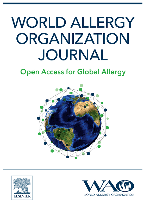
World Allergy Organization Journal
Innovating Solutions for Allergic Diseases WorldwideWorld Allergy Organization Journal is a premier open-access publication dedicated to advancing the understanding and treatment of allergic diseases and related conditions. Published by ELSEVIER, this journal boasts a commendable impact factor and ranks in the second quartile for both Immunology and Allergy, as well as the first quartile in Pulmonary and Respiratory Medicine. Since its inception as an open-access journal in 2008, it has consistently aimed to provide a credible platform for researchers, clinicians, and students to disseminate original research, reviews, and clinical studies. With its emphasis on high-quality scholarship and practical applications, the World Allergy Organization Journal plays a crucial role in bridging theoretical knowledge with clinical practice, making significant contributions to the fields of immunology, allergy, and respiratory medicine. The journal is particularly notable for its accessibility to a global audience, exemplified by its open-access model since 2008, promoting a wider exchange of ideas and innovations across borders.
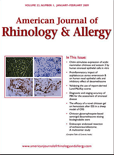
American Journal of Rhinology & Allergy
Bridging laboratory discoveries with clinical excellence.Welcome to the American Journal of Rhinology & Allergy, a leading publication in the fields of otolaryngology and immunology, published by SAGE Publications Inc. Since its inception in 2009, this journal has played a pivotal role in disseminating cutting-edge research and reviews, addressing critical topics related to sinus disease, allergic disorders, and respiratory health. With an impressive Scopus ranking that places it in the top quartiles of both immunology and medicine, the journal garners about a 90th percentile ranking in otorhinolaryngology, reflecting its significance in advancing medical knowledge and clinical practice. The American Journal of Rhinology & Allergy aims to bridge the gap between laboratory research and clinical application, providing a platform for researchers and professionals to explore innovative therapies and treatment protocols. Access options include traditional subscription models to ensure comprehensive support for the academic community. Join our efforts to enhance understanding and treatment in the critical area of rhinology and allergy.
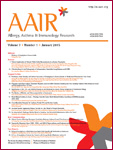
Allergy Asthma & Immunology Research
Exploring breakthroughs in respiratory and immune health.Allergy Asthma & Immunology Research, published by the Korean Academy of Asthma Allergy & Clinical Immunology, is a leading journal dedicated to advancing the fields of immunology, allergy, and respiratory medicine. With an ISSN of 2092-7355 and an E-ISSN of 2092-7363, this esteemed publication has been a cornerstone for researchers and practitioners since its inception in 2009 and continues to disseminate critical findings through till 2024. The journal is ranked in the Q3 category in Immunology and the Q2 category in Immunology and Allergy as well as Pulmonary and Respiratory Medicine, illustrating its impact in these vital fields. With a solid Scopus ranking in multiple sub-disciplines, the journal not only contributes to the scientific discourse but also promotes innovative research and clinical practices. Although currently operating without an open access model, the journal remains highly regarded for its thorough peer-review process and commitment to academic excellence, making it an essential resource for professionals, researchers, and students passionate about advancing knowledge in allergy, asthma, and immunology.
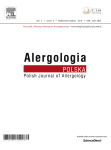
Alergologia Polska-Polish Journal of Allergology
Illuminating the pathways of allergy mechanisms and treatments.Alergologia Polska - Polish Journal of Allergology, published by TERMEDIA PUBLISHING HOUSE LTD, is a distinguished academic journal dedicated to advancing the field of allergy research and treatment. With the ISSN 2353-3854, this journal serves as an essential resource for professionals, researchers, and students alike, offering a platform for the dissemination of novel findings and comprehensive reviews in allergic diseases. The journal emphasizes open access to ensure widespread availability and engagement within the scientific community. Alergologia Polska aims to enhance the understanding of allergy mechanisms, diagnostics, and management strategies, fostering collaboration and innovation among experts in the field. Set against the vibrant backdrop of Poznań, Poland, this publication not only highlights clinical and experimental research but also promotes interdisciplinary discussions that are pivotal for tackling complex allergic conditions globally.
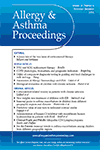
ALLERGY AND ASTHMA PROCEEDINGS
Advancing knowledge in Allergy and Asthma research.ALLERGY AND ASTHMA PROCEEDINGS, published by Ocean Side Publications Inc, is a vital resource in the fields of Immunology, Allergy, and Pulmonary Medicine. With an impressive trajectory of publication from 1996 to 2024, this journal serves as a platform for cutting-edge research and advancements in the understanding of allergic and asthmatic conditions. Positioned in the Q3 quartile for Immunology and Allergy and Q2 for both Medicine (miscellaneous) and Pulmonary Medicine, the journal exhibits a robust impact within the academic community, boasting Scopus rankings that reflect its significance. The journal offers open access options, allowing for the dissemination of critical findings to a wider audience. Aimed at researchers, healthcare professionals, and students alike, ALLERGY AND ASTHMA PROCEEDINGS addresses the complexities of respiratory diseases and facilitates the sharing of knowledge that is essential to improving patient care and outcomes.

Alergia Astma Immunologia
Fostering collaboration for improved patient outcomes.Alergia Astma Immunologia is a dedicated journal focusing on the interdisciplinary fields of immunology and respiratory medicine, published by the Asthma and Allergy Patients Support Organization in Poland. With a commitment to advancing research and sharing knowledge, this journal serves as a platform for scholars and practitioners to discuss critical issues and recent advances in allergy, asthma, and immunological disorders. Despite being in Category Quartiles Q4 for both Immunology and Allergy and Pulmonary and Respiratory Medicine, its importance is highlighted by its continuous publication since 2000, providing a historical perspective on evolving scientific insights. Researchers and clinicians alike benefit from accessing novel findings and case studies that contribute to improved patient outcomes and innovative therapeutic strategies. While the journal currently offers limited open access, its commitment to providing high-quality, peer-reviewed content ensures its relevance in the academic discourse within these vital areas of health science. The journal aims to foster collaboration, stimulate research interest, and promote evidence-based practices within the professional community.

ASIAN PACIFIC JOURNAL OF ALLERGY AND IMMUNOLOGY
Bridging the gap between research and clinical practice.The ASIAN PACIFIC JOURNAL OF ALLERGY AND IMMUNOLOGY, published by the Allergy Immunology Society of Thailand, is a pivotal platform for disseminating high-quality research in the fields of allergy and immunology. Established in 1983, this journal has consistently evolved to address the pressing challenges and advancements in these dynamic disciplines, contributing significantly to the global scientific community's understanding of immunological disorders. With a category ranking of Q3 in Immunology and Allergy, and Q2 in Medicine (miscellaneous) for 2023, the journal stands at the forefront of impactful research, engaging with a diverse audience of researchers, clinicians, and students alike. Although it operates on a non-open access model, its rigorous peer-review process ensures that published articles meet the highest academic standards. Located in Bangkok, Thailand, the journal connects researchers across the Asia-Pacific region, fostering collaboration and innovation to enhance patient care in the realm of allergy and immunology.

Asia Pacific Allergy
Advancing Allergy Insights Across the Asia PacificAsia Pacific Allergy, published by Lippincott Williams & Wilkins, is a prominent academic journal dedicated to advancing research and clinical practice in the fields of dermatology, immunology, and allergy. With its ISSN 2233-8276 and E-ISSN 2233-8268, the journal provides a platform for innovative studies and reviews that cater to an international audience of researchers, healthcare professionals, and students involved in allergy and related disorders. Although it does not currently offer open access to its publications, the journal's robust output from 2015 to 2017 and its ongoing contribution to the literature from 2021 to 2024 showcase the evolving landscape of allergy research in the Asia Pacific region. Recognized in the 2023 Journal Citation Reports, it holds a Q2 ranking in Dermatology and a Q3 ranking in Immunology and Allergy, while its Scopus ranks further emphasize its significance within these domains, positioning it among the top journals in the field. As a source of cutting-edge research, Asia Pacific Allergy plays a vital role in fostering collaboration and knowledge dissemination, ultimately assisting in the betterment of patient care and treatment strategies across the region.
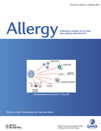
ALLERGY
Driving Insights into Allergy Mechanisms and Treatments.ALLERGY is a leading international journal published by WILEY, dedicated to advancing the understanding of allergic diseases and immunology. With an ISSN of 0105-4538 and an E-ISSN of 1398-9995, this esteemed journal has been at the forefront of the field since its inception in 1948 and continues to publish high-quality research up until 2024. Positioned in the Q1 category for both Immunology and Allergy, ALLERGY ranks impressively within the top percentiles of its categories, underscoring its significant impact, as reflected in its Scopus rankings (#11 out of 233 in Immunology and Allergy, and #14 out of 236 in Immunology and Microbiology). Researchers and practitioners accessing this journal can expect a rigorous selection of peer-reviewed articles that address current challenges, innovative therapies, and advancements in the immunological sciences. Although it is not an open-access journal, ALLERGY remains vital for academics, healthcare professionals, and students alike, fostering a deeper understanding of the mechanisms and treatments associated with allergies.
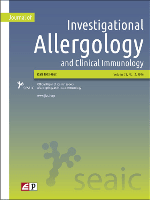
JOURNAL OF INVESTIGATIONAL ALLERGOLOGY AND CLINICAL IMMUNOLOGY
Advancing knowledge in Allergy and Immunology.JOURNAL OF INVESTIGATIONAL ALLERGOLOGY AND CLINICAL IMMUNOLOGY is an esteemed publication dedicated to the fields of Immunology and Allergy, published by ESMON PUBLICIDAD S A in collaboration with the Department of Allergy and Clinical Immunology at the University Clinical Navarra, Spain. With its rich history spanning over three decades since its inception in 1991, this journal has gained prominence in the scientific community, holding a commendable Q2 quartile in Allergy and a Q3 quartile in Immunology. Ranked within the top tiers of its categories according to Scopus, it stands at Rank #80/233 in Immunology and Allergy, and Rank #96/236 in Immunology and Microbiology, indicating its influential role in disseminating cutting-edge research and clinical insights. Though primarily print-focused, the journal strives to bridge gaps in knowledge and contribute to the ongoing dialogue among researchers, professionals, and students in the immunological sciences. The JOURNAL OF INVESTIGATIONAL ALLERGOLOGY AND CLINICAL IMMUNOLOGY is essential for anyone committed to advancing the understanding of allergic and immunological conditions.